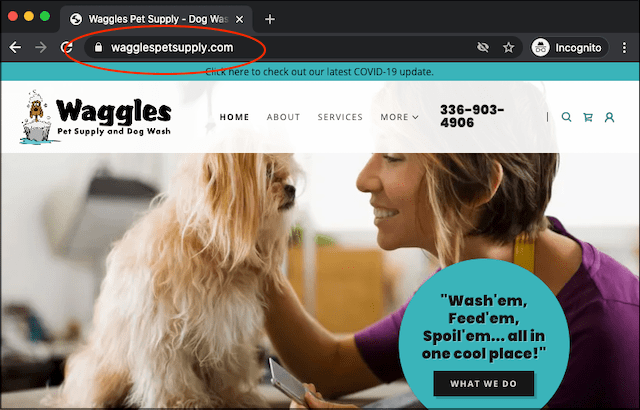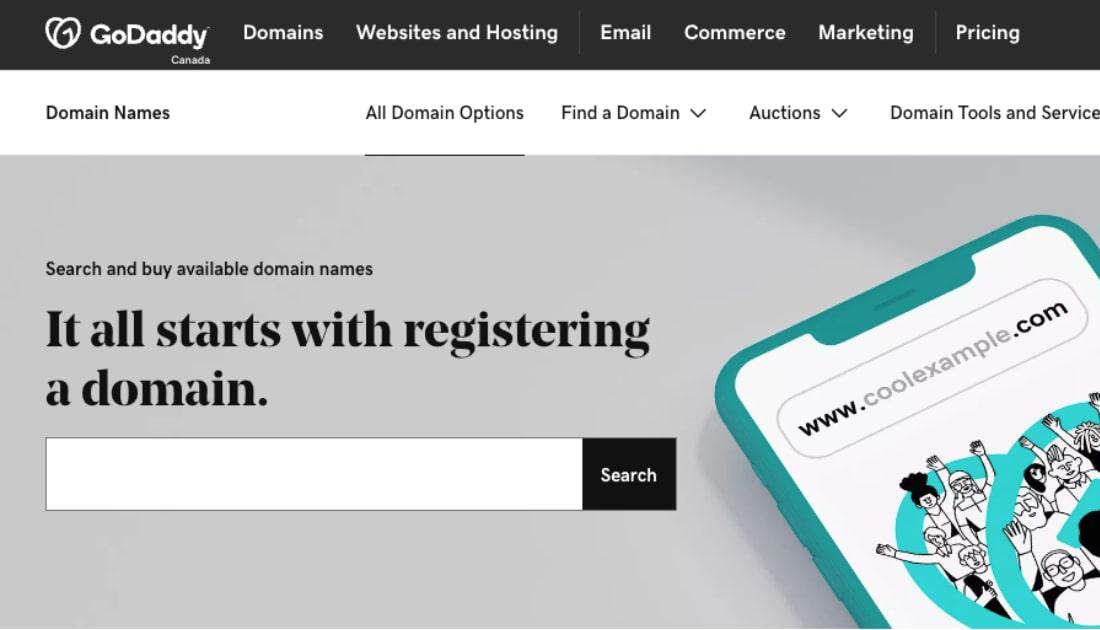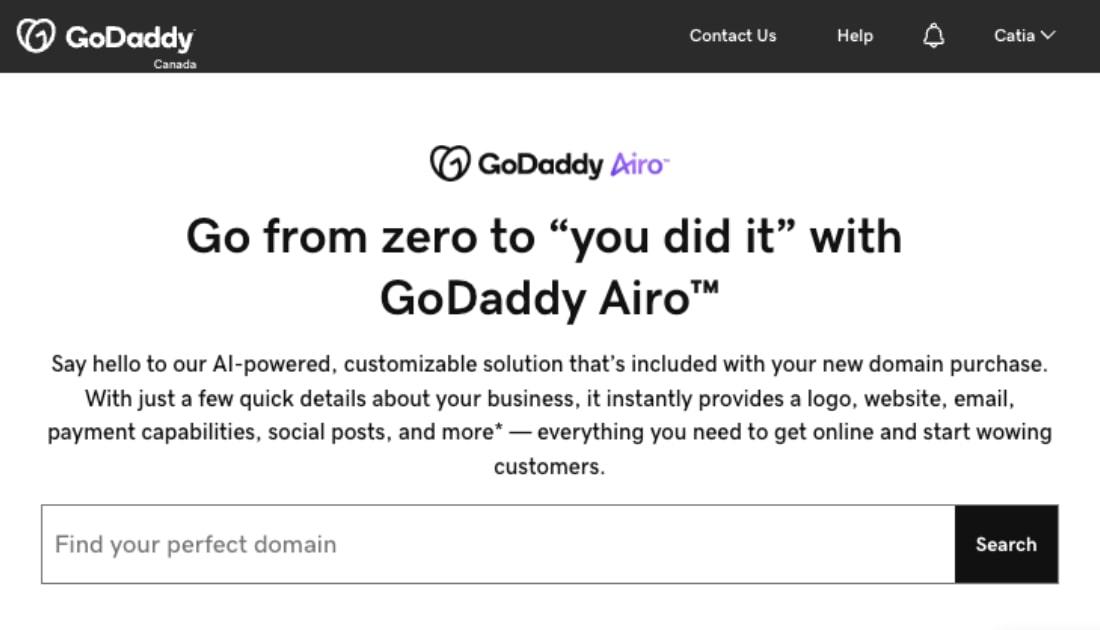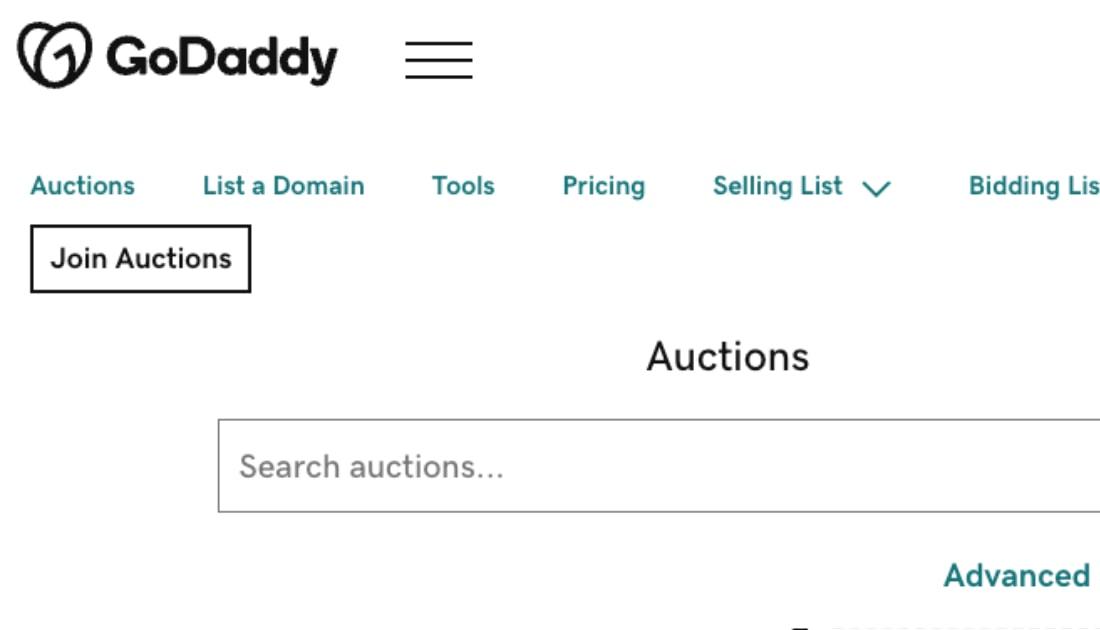Whether you’re starting a business, a neighborhood club or a YouTube channel, your web name is one of your first and most important decisions.
Also called a domain name, it serves as your website address. It’s more than just the name that people see first thing in Google. It’s how people will find you online.
People will make snap judgements based on your www.

Whether it’s painted on a shop window or highlighted in your Instagram bio, your web name will tell people a lot about you. Choosing the right one has everything to do with how successful you are online.
Editor’s note: Tell GoDaddy Airo about your idea and it will generate a domain name, logo, website, social media handles, professional email and more — all for the price of your domain name.
First things first: the end of your web name
The first thing to think about is actually the part of a web address that shows on the other side of the dot.
A domain extension provides a little bit more information about you, such as what kind of organization you are or where you’re located.
By far the most commonly used domain extension is .com — so much so that it’s basically synonymous with internet-based business.
Just about all of the biggest companies in the world use it, and it’s the go-to for many small and medium-sized businesses too. Not only is .com considered the most trustworthy domain extension, it’s also the easiest to remember.
There’s also something definitive about .com. Some argue that if you go with an alternative, you leave your brand open to confusion.
For example, if you registered a .ca domain name because the .com you wanted was already taken, customers can easily get confused when they’re searching for you.
If you want your web name to express authority and trustworthiness, .com remains the gold standard.
But is it essential to have a .com web name?
The downside to .com is that it’s been around for so long that you may have a harder time getting the web name you want.
HighStreeBoutique.com or HalifaxAuto.com may already be taken by a business halfway across the world, or a domain investor could be sitting on it, hoping to sell it for a figure you’re not willing to pay. If you want to find out who owns a domain, use a free tool like WHOIS.
Looking beyond .com

Photo: Kvalifik on Unsplash
If you can’t get the web name you want as a .com, you might want to turn to one of the new domain extensions. Here are just a few of the 1,000+ now available:
For Canadian businesses, .ca is a good option if your focus is local. A .ca web name might even give you a boost in local search results, which would mean more visitors to your business website.
Related: 4 reasons Canadian businesses need a .ca domain
Consider an industry-specific extension
Another option if you can’t get the .com of your business name is to use a domain extension that describes what you do. For example:
A real estate agent whose business name is Smith Real Estate might try registering Smith.RealEstate. A construction company named Rafael Construction could see if Rafael.Construction is still available. The new domain extensions open a whole new world of naming options.
Check to see if the domain you want is available now
Location-based extensions are a good option for local businesses
You may be able to use place-specific domain extensions, like .nyc or .quebec, though some have restrictions on where your business is in fact located.
This could be a way to show your local pride or to advertise travel services to that city.
There are also country-code top-level domains (ccTLD) that simply say where you’re located, like .ca or .us. Some country codes are open for anyone to use and can be used creatively, like Colombia’s .co or Micronesia’s .fm, a popular option for radio stations.
These domain extensions are good options if your first-choice web name is already taken as a .com. It can also give your business a playful or creative personality, as with .me extensions.
Pro tip: If your customers are primarily in Canada, a .ca is a solid choice. Research shows that Canadians prefer to patronize businesses with web names that end in .ca.
Do domain extensions affect your search engine ranking?
The short answer is: not negatively. Using a new domain will not hurt your search results, so you don’t have to worry too much if you choose something tailored to your industry.
In some cases, your domain name can actually play a positive role in your SEO strategy.
Web names that contain keywords (i.e. the words people type in when searching for goods or services like yours):
- Tend to rank higher on search engine results pages
- Have a higher click through rate
That brings more eyes to your business.

If you aren’t sure what keywords you should be targeting, you can always chat with an SEO consultant. There are also great tools out there to conduct keyword research and find out what people are searching for when they’re trying to find the solutions, services, and products you offer.
Related: Local SEO for Canadian businesses
Your web name is too important to rush
When your business has a web name that’s easy to remember, customers are more likely to visit your site. People are stretched for time. The fewer barriers there are between them and your online presence, the likelier they are to find you and keep coming back.
They’ll also be more likely to accurately share your web name with friends when they recommend you.
A good extension improves website visitation and conversion. People are more likely to click through from search engine result pages when the URL tells them everything that they need to know about you. The right extension adds that little bit of extra information that can go a long way.
UPDATE: This article on web names was first published on 2 December 2020 and updated 20 October 2022.










